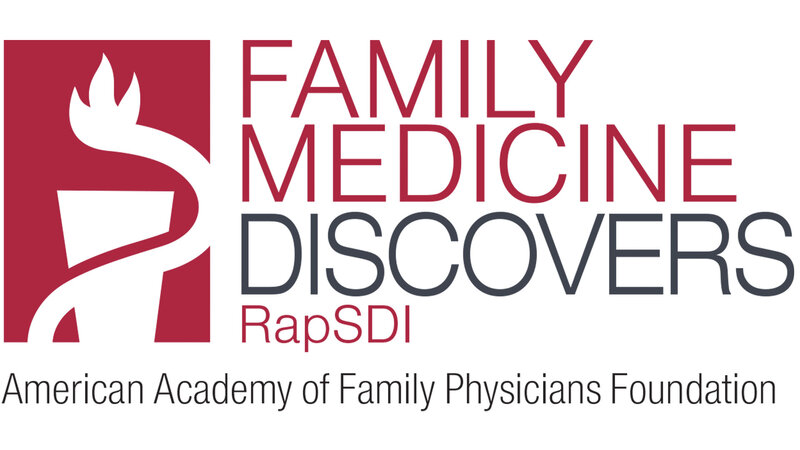Groundbreaking Rapid Research Program’s Contribution to Family Medicine
2023 FMD RapSDI Scholars

The Family Medicine Discovers Rapid Cycle Scientific Discovery and Innovation (FMD RapSDI) program empowers doctors to research and scale great ideas, quickly. Every year, two select FMD RapSDI Scholars receive up to $40,000 to create new evidence for “what works” in real-world primary care settings. We’re pleased to announce that the 2023 RapSDI Scholars are T.M. Ayodele “Ayo” Adesanya, M.D., Ph.D., and Chris Oh, M.D.
T.M. Ayodele “Ayo” Adesanya, M.D., Ph.D.
The Ohio State University Dept. of Family and Community Medicine
Study/Project Title: “Medical-Financial Partnerships in Family Medicine: Assessing Health Impact and Feasibility”
Dr. Ayo Adesanya’s research explores medical-financial partnerships in Family Medicine. To determine how stronger financial health impacts personal health, intervention participants will be paired with financial coaches and control participants will be provided financial education booklets. Both groups will be screened pre- and post-intervention to assess differences in overall, cardiometabolic, mental, and financial health.
“Results from this project will advance knowledge toward collaborative opportunities to target poverty and financial stress as social determinants of health and reduce associated health and wealth disparities,” said Adesanya. “Systemic challenges to improving financial well-being exist and will unfortunately remain, but individual-level interventions may mitigate some of the detrimental impacts of poverty and financial stress.”
Adesanya shared that he is grateful for the mentorship with the AAFP National Research Network and staff at the DARTNet Institute, a research nonprofit that conducts practice-based, family medicine research, as it helped him “robustly develop and launch these pilot, patient-centered studies and learn novel qualitative, mixed method, implementation science, and community-based design and analysis approaches.”
Growing up in urban and rural medically underserved communities in Dallas and southern Illinois and with paternal roots in Ogun State, Nigeria, Adesanya said he is "committed to studying and reducing the burden of health disparities in chronic diseases. Further opportunities exist for family medicine physician-scientists to improve biomedical communication, facilitate community engagement in translational research and increase the pipeline of scholars from disadvantaged backgrounds."
Currently, Adesanya is in the recruitment and enrollment phase of his study, and participants attending financial coaching sessions or receiving a financial education booklet in the fourth quarter of 2023. From January to March 2024, participants will complete post-intervention surveys, assessments and interviews, and from April to June 2024, Adesanya’s team will complete data analysis and prepare for dissemination of their project findings.
Chris Oh, M.D.
Montefiore Medical Center Dept. of Family and Social Medicine
Study/Project Title: “Penicillin Allergy Delabeling Initiative in Primary Care”
Dr. Chris Oh’s research examines penicillin allergies in primary care and seeks to explore the efficacy and safety of a penicillin allergy de-labeling initiative. Patients with a history of a penicillin allergy will be offered an in-office oral challenge where they will be given progressively larger doses of penicillin and monitored for potential reactions.
"At this stage of my career, I did not have much training in research, so this scholarship was a nice stepping stone considering the assistance available in areas like ideation, protocol and budget," said Oh.
Since research was not top of mind for Oh, a conversation with his wife, Jessica Oh, M.D., led to his study topic. With two doctors at the dinner table, clinical questions are frequent. As an allergist studying drug allergies, Jessica was able to help Oh understand more about penicillin allergy protocol. He quickly learned that other colleagues were intrigued by the topic and eager to learn more from his research.
“As a primary clinician, I have the power over how to prescribe antibiotics,” said Oh. “Delabeling will add to the conversation where 90 plus percent of people have this label in their chart with many for unwarranted reasons.” For example, Oh sees many patients grow out of their penicillin allergies or not really have the allergy, relying only on family history in their chart.
While the study is still in the IRB process, Oh believes the work is important for the health care system. "We should [be] do[ing] something about it yesterday and not today." After IRB approval, the delabeling visits will begin in the fall 2024.
Adesanya and Oh are both keenly aware that their research is made possible by generous donors who value enabling family physicians to address challenges and opportunities through research. Applications are now open for 2024. Interested in learning more? Visit the program page for info session dates and times, as well as application information.